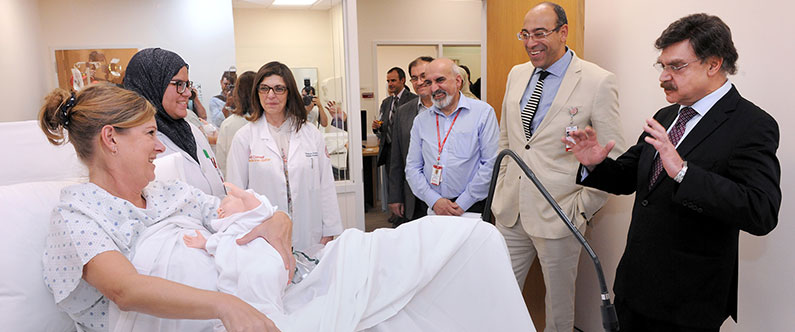Hi-tech skills lab launched
 A simulation of a birth was used to demonstrate the technology in the center and its importance as an educational tool.
A simulation of a birth was used to demonstrate the technology in the center and its importance as an educational tool.
Students at WCM-Q are now learning to become doctors in one of the region’s most technologically advanced facilities after the college launched its modernized Clinical Skills and Simulation Lab (CSSL).
The newly expanded and upgraded state-of-the-art facility is now equipped with a wider selection of cutting-edge teaching aids that simulate real-world clinical situations, allowing students to gain the practical skills they need in a risk-free environment under the guidance of WCM-Q’s highly trained teaching faculty.

The hi-tech equipment includes uncannily lifelike medical mannequins that are able to simulate a vast range of symptoms, from a racing heartbeat and dilated pupils, to a swollen tongue or a full-blown seizure, among many others - all controlled remotely by a technician. Students working with the mannequins can practice responding to an almost limitless array of conditions as if they were in a real ER (emergency room), such as a cardiac arrest, respiratory infections, heatstroke or even childbirth.
The CSSL, formerly known as the Clinical Skills Center, has been expanded from 8,500 to 10,500 square feet and now has 12 clinical examination rooms, up from six previously. Each examination room is fully equipped with diagnostic instruments for examining the ears and eyes and measuring blood pressure and temperature. Students learn to utilize these instruments under instructor supervision and with the help of ‘standardized patients’ – individuals trained to play the role of patients.
Other facilities in the revamped suite include hi-tech training aids for practicing administering joint injections, taking blood samples, inserting intravenous lines and using portable ultrasound machines. There is also a cardiopulmonary patient simulator and a variety of 3D anatomical models.
Dr. Stella Major, associate professor and director of the CSSL, said: “The new Clinical Skills and Simulation Lab really offers learners at WCM-Q the opportunity to benefit from state-of-the-art facilities during their medical training. Students now have the chance to practice and perfect a wide range of communication and procedural skills before entering the real world of patient care. While in clinical training the students can also benefit from the center by using it to augment their skills and address their skill gaps and needs in a safe environment, to attain a very high level of proficiency. This will help them to be extremely well prepared for the demands of modern medicine.
“The expanded space permits more students to engage in simulation-based educational activities at any one time, and therefore requires less time to be taken from their busy curricular schedules. This is a tremendously exciting moment for all of us because we feel this new facility ensures that the education offered at WCM-Q remains up there with the very best anywhere in the world.”
Simulation-based learning is a key emerging trend in the education of medical practitioners and numerous other health professions. Research has shown that students and qualified healthcare practitioners who practice and retain their expert skills in a simulated environment have markedly higher success rates in performing a variety of medical procedures and see a dramatic reduction in errors in patient care, thereby enhancing patient safety. They also show improved teamwork and inter-professional communication and enjoy greater professional fulfillment.
Working with standardized patients allows medical students to develop critical interpersonal skills that help put patients at ease, while working in teams on practical tasks accurately recreates real-world clinical practice. Having begun with 12 standardized patients back in 2005, WCM-Q now has about 75 standardized patients.
Lan Sawan, manager of the CSSL, said: “We are very pleased that we now have this extremely advanced facility available to help our students gain the practical skills they need to provide absolutely world-class care to their patients when they enter the clinic on rotations and after they qualify.”
The CSSL also has a newly updated high-definition audio-visual system with remotely controlled cameras placed in strategic locations. This allows evaluators to discreetly observe and evaluate students without disturbing learning activities. Students can reflect on their own skills by accessing their videos from college premises, helping them to identify and address their skill gaps and reinforce their strengths, as they learn to become more self-aware.
Enhancing and expanding the CSSL complements the integrated Six-Year Medical Program at WCM-Q, which comprises a two-year pre-medical curriculum and a four-year medical curriculum, both of which place more emphasis on the attainment of practical physcianship skills than tradition medical curricula. Upon graduation, students receive the same Cornell University MD degree awarded to students at Weill Cornell Medicine in New York.
Dr. Javaid Sheikh, dean of WCM-Q, said: “At WCM-Q we have always been enthusiastic early adopters of new technologies that enable us to continuously enhance the standard of education we offer to our students, and the re-launched Clinical Skills and Simulation Lab adheres to this important principle. The new facility not only brings WCM-Q up to date with the latest innovations in medical education but puts us ahead of the curve, which will be of enormous benefit to both our students and the patients they will care for after they graduate.”